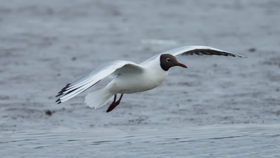
Residents are being urged not to touch or pick up dead or sick birds after three more cases of avian flu have been confirmed in wild birds in Nottinghamshire.
The latest cases were discovered in three black-headed gulls in Thurgarton, following five confirmed cases in wild birds that were found near the River Idle in Newington earlier in May.
The public is advised not to touch or pick up any dead or sick birds that they find.
Avian Influenza is in no way connected to the COVID-19 pandemic, which is caused by the SARS-CoV-2 virus and is not carried in poultry.
Wild birds migrating to the UK from mainland Europe during the winter months can carry the disease and this can lead to cases in poultry and other captive birds, so it is vital to not allow wild birds to mix with chickens, ducks, geese or other birds.
Following these latest confirmed cases, Nottinghamshire County Council’s Trading Standards team is issuing advice and working with Newark and Sherwood District Council and other partner agencies to reduce the risk of the spread of the disease.
Since April 2023 it has been a legal requirement for all bird keepers across the UK to follow strict biosecurity measures in order to limit the spread of the disease. These measures apply to all bird keepers, whether they own pet birds, a few chickens or a full commercial flock.
Strict biosecurity measures include regularly cleaning and disinfecting equipment, clothing and vehicles when entering or exiting sites and limiting access to non-essential workers or visitors. These measures will be kept under regular review as part of the government’s work to protect flocks.
UK Health Security Agency (UKHSA) advises that although the risk to human health from the virus is very low, people can catch bird flu via direct contact with a live or dead bird carrying the virus, or via direct contact with bird faeces from a bird carrying the virus. Therefore, it is vital that anyone spotting any sick or dead birds does not touch them and that they contact the Department for Environment, Food and Rural Affairs (DEFRA).
It is important to stress however that humans cannot catch bird flu via airborne particles. Food standards bodies also advise that avian influenzas pose a very low food safety risk for UK consumers. There is no impact on the consumption of properly cooked poultry products including eggs.
Councillor John Cottee, Cabinet Member for Communities at Nottinghamshire County Council, said: “The discovery of dead birds is always upsetting and the news that they have tested positive for avian flu will obviously be of concern to residents and visitors, however the risk of the disease transferring from birds to humans is considered to be very low. That said, it is important that people do not touch any sick or dead birds and I would also urge people not to feed any swans and geese, particularly around Thurgarton and the River Idle in Newington, as feeding encourages them to congregate and that increases the risk of the disease spreading.
“As well as issuing an appeal for the public not to touch or move dead birds, I am also asking dog owners to keep their pets away from them.”
Anyone who finds dead wild waterfowl (swans, geese or ducks) or other dead wild birds, such as gulls or birds of prey should report them to the DEFRA helpline (03459 33 55 77).
Bird keepers should report suspicion of disease in England to Defra Rural Services Helpline on 03000 200 301. Keepers should familiarise themselves with avian flu advice which can be found on the gov.uk website.
Although it is optional for people with less than 50 poultry or captive birds to register their birds with Defra, they are advised to do so to ensure they get regular updates on this order.
For further information search “avian influenza” at GOV.UK and to register poultry visit www.gov.uk/guidance/poultry-registration.
ENDS
